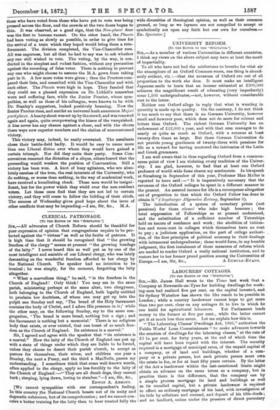UNIVERSITY REFORM.
[TO THE EDITOR OF THE "SPECTATOR."] SIR,—As a member of various Universities in different countries, 1 think my views on the above subject may have at least the merit of impartiality.
To all who have not had the misfortune to breathe for vital air the atmosphere of an Oxford Common-room, one thing is abund- antly evident, viz. :—that the revenues of Oxford are out of all proportion to the work she does. It must make an intelligent Japanese smile to learn that an income estimated at £300,000 achieves the magnificent result of educating (very imperfectly) some 1,500 undergraduates,—not, however, without considerable cost to the latter.
Neither can Oxford allege in reply that what is wanting in quantity is made up in quality. On the contrary, I do not think it too much to say that there is no German University, however small and however poor, which does not do more for science and letters than Oxford. The richest German University has an endowment of £12,000 a year, and with that sum manages to do nearly or quite as much as Oxford, with a revenue at least twenty-five times as large. But these German Universities do not provide young gentlemen of twenty-three with pensions for life as a reward for having mastered the intricacies of the Latin and Greek grammars.
I am well aware that in thus regarding Oxford from a common- sense point of view I am violating every tradition of the Univer- sity. I am glad, however, to find that at least one Oxford professor of world-wide fame shares my sentiments. In his speech at Strasburg in September of this year, Professor Max Miller is reported to have said :—" It is imperatively necessary that the revenues of the Oxford colleges be spent in a different manner to the present. An assured income for life is a recompense altogether out of proportion to that which the Oxford Fellow has done to obtain it" (Augsburger Allgenzeine Zeitung, September 5).
The introduction of a system of monetary prizes (not pensions) for those alumni who take high honours ; the total suppression of Fellowships as at present understood, and the substitution of a sufficient number of Tutorships held on tenure of residence and work ; the abolition of tuition- fees and room-rent in colleges which themselves have no rent to pay ; a judicious application, on the part of college authori- ties, of the first principles of political economy in their dealings with intramural undergraduates ; these would form, in my humble judgment, the first instalment of those measures of reform which are needed to render Oxford a really national institution, and to restore her to her former proud position among the Universities of










































 Previous page
Previous page